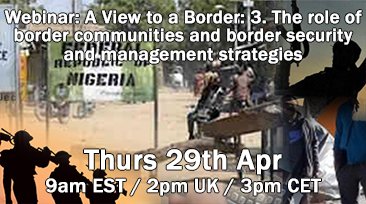A View to a Border: 3. The Role of Border Communities and Border Security and Management Strategies
The role of border communities and border security and management strategies in the context of cross border cooperation and information sharing to counter terrorism and related transnational organized crime.
The role of border security and management (BSM) strategies and border communities has emerged as a significant priority in Africa. The rise of violent non-state actors, terrorist organizations, and transnational organized crime groups involved in the illicit trafficking of weapons, drugs, and human beings, especially in border regions, poses a serious threat to the stability and development and highlights the imperative of enhancing border management in the region. A new approach is needed to secure the strengthening of border management and human security in border regions based on the “good practices” in the area of BSM in the context of counterterrorism. In parallel with building the capacities of border agencies and increasing the physical presence of the State in border areas, improved interaction with local populations is required to better articulate them to legitimate law and order efforts, as well as to protect and promote the informal cross-border trade that is often critical to their livelihoods and food security in the region.
Adoption of national border security and management (BSM) strategies support African countries to move toward a better and more sustainable balance between open but secure borders by preventing security threats while facilitating vital cross-border trade and licit movements. In 2013, the African Union (AU) drafted a distinctive continental strategy for improving border management to serve as a guideline for individual countries. The three pillars of the AU strategy are intra-agency and international cooperation, capacity development, and involving border communities in border management. However, with the exception of Senegal, West African states have not yet moved toward a common approach at either national or sub-regional level to adopt holistic BSM strategies. Implementing BSM strategies and national action plans (NAPs) will increase ownership among communities and their overall effectiveness ensuring that a cohesive linkage through collaboration among all stakeholders enhances cross-border cooperation and denies space to extremists and undermines their violent ideology.
Community involvement in border management is understood as particularly important in West Africa at the present time to ensure that security responses do not compromise human rights or inhibit unduly the free movement of goods and people. Community-based policing should form the basis for an intelligence-led interdiction approach to complement traditional border control methods. Engaging with and empowering border communities as key contributors in BSM has been recognized as a good practice to facilitate mutual trust-building with national border services, increase intelligence and information sharing through a variety of means, including public awareness to enhance communication and cooperation among neighboring border services, and strengthen cross-border coordination among relevant law enforcement agencies (LEA) to effectively prevent radicalization and violent extremism, and combat terrorism and related transnational organized crime, as well as the threat of foreign terrorist fighters (FTFs).
Speaker and Presenter Information
Opening Remarks
- Mr. Rocco Messina, Head, UNCCT-Border Security and Management Unit
- Dr. Emmanuel Wekem Kotia, Brigadier General of the Ghana Armed Forces and Chief Executive of the Ghana Boundary Commission
Keynote Speakers
- Dr. Amado Philip de Andres, UNODC Regional Representative for West and Central Africa
- Mr. Brian Finley, President and CEO, the Stimson Center
Session 1: Case Study: The Accra Initiative: Operations Koudanlgou II & III
- Mr. Benedict Dere, Technical Director and Liaison Officer for the Accra Initiative, Ministry of National Security, Ghana
Session 2: Interactive Dialogue
- Dr. Amado Philip de Andres, UNODC Regional Representative for West and Central Africa
- Mr. Brian Finley, President and CEO, the Stimson Center
- Dr. Kamal-Deen Ali, Executive Director of the Centre for Maritime Law and Security Africa
- Ms. Sophie Hoffmann, Head of the Border Security and Immigration Unit, IOM Niger
- Dr. Esther Zubiri, UNOCT-UNCCT Senior Expert
Relevant Government Agencies
Intelligence Agencies, DOD & Military, Dept of Homeland Security, Other Federal Agencies, State Government, Municipal Government, CIA, Coast Guard, Federal Government, State & Local Government, Foreign Governments/Agencies, NSA
Event Type
Webcast
This event has no exhibitor/sponsor opportunities
When
Thu, Apr 29, 2021, 9:00am - 10:30am
ET
Cost
Complimentary: $ 0.00
Website
Click here to visit event website
Organizer
Torch Marketing Co Ltd
Join the event conversation:
@worldbordersec
#bsr #uncct #unoct #bordersecurity






